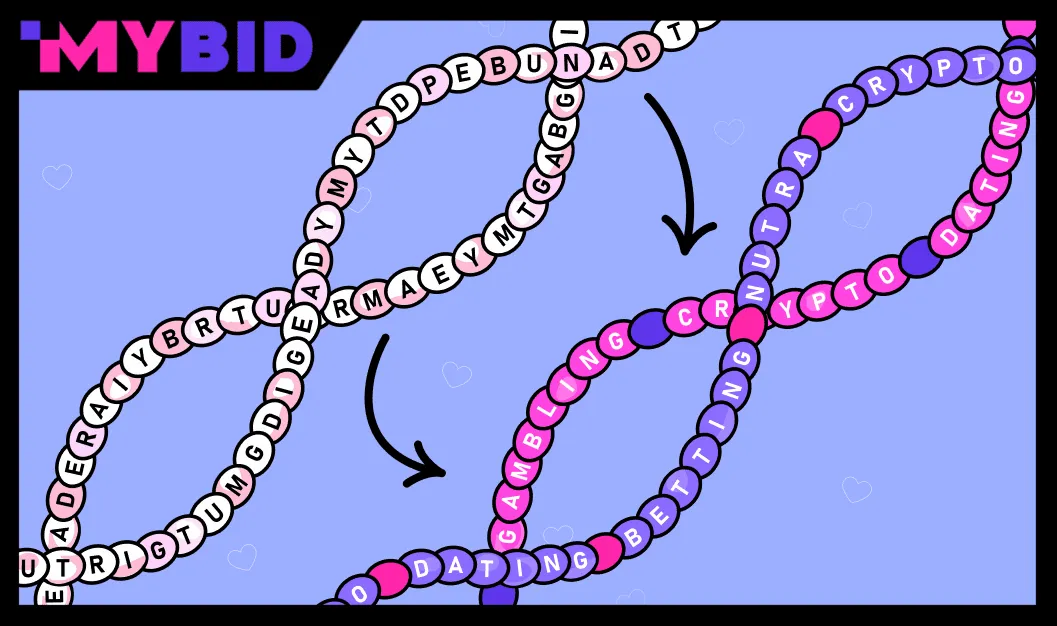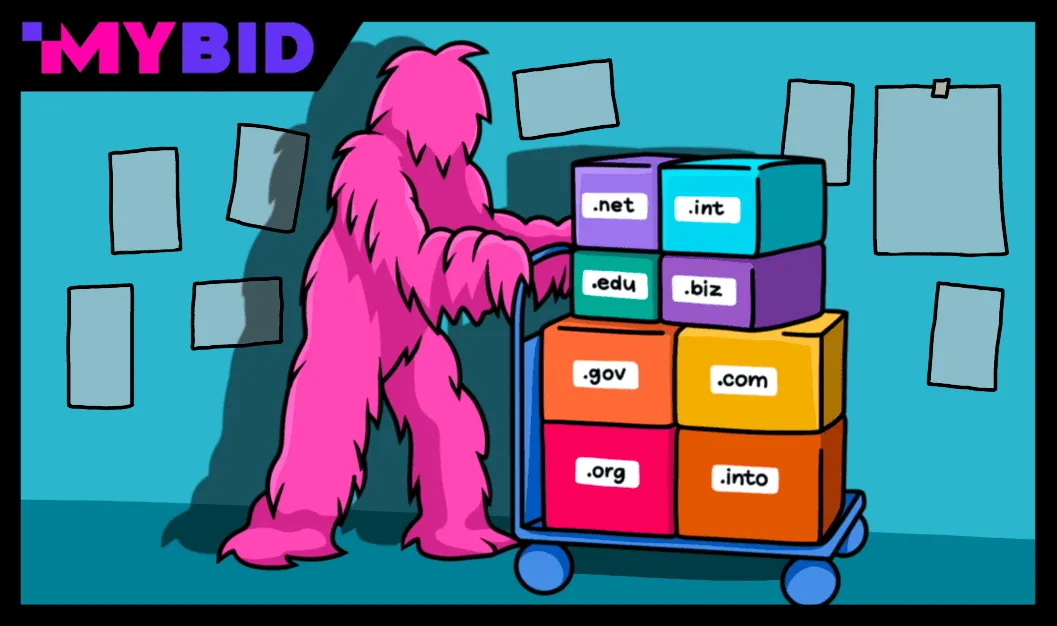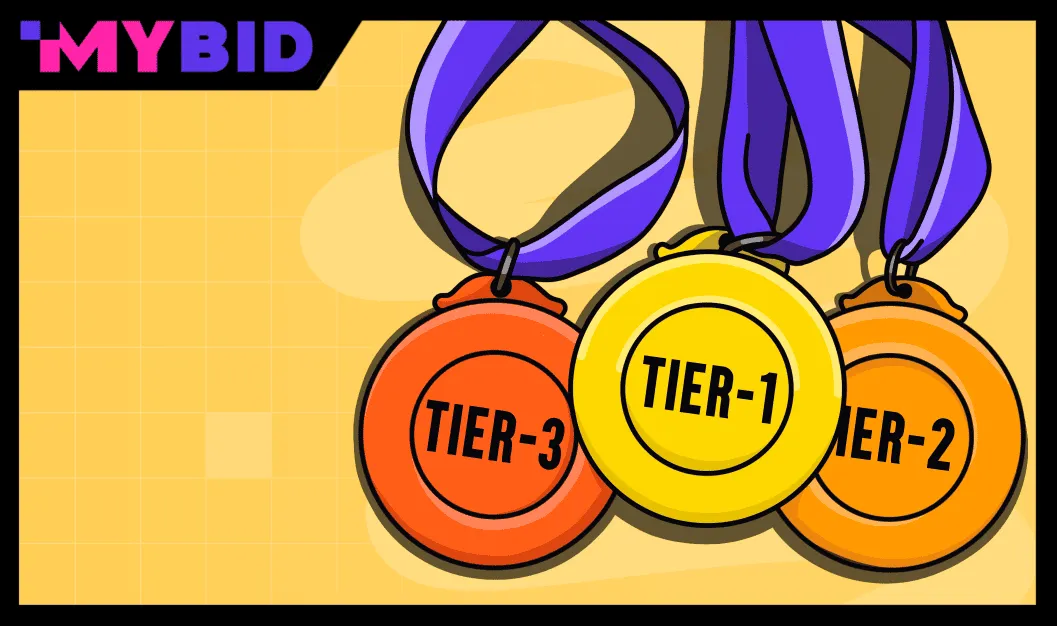To make money in the affiliate marketing industry, you need to find not only sources of traffic but also offers with favorable conditions. Such products can be found through CPA networks.
What are CPA networks?
CPA networks are platforms that distribute offers and affiliate programs for advertisers. They connect companies that need customers with affiliates who have the ability to drive traffic and generate conversions. In some cases, advertisers run their own affiliate networks directly.
In affiliate marketing, traffic is purchased from various sources which differ in their barrier to entry. The easiest way to test new offers is with traffic from a CPA ad network.
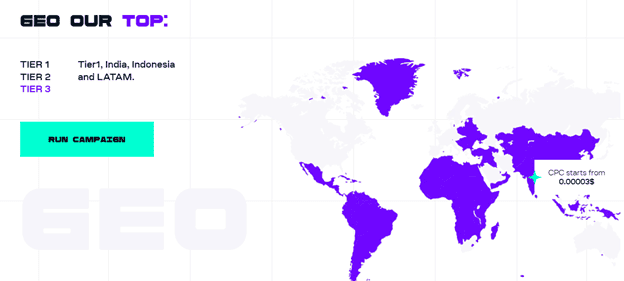
Affiliates direct the purchased traffic to the affiliate network’s products. Let's look at how this process works in more detail.
How affiliate networks work
There are three main groups involved in affiliate marketing: advertisers, affiliates, and affiliate networks. Each side has its own distinct goals.
Advertisers need specific actions taken by users such as registrations, app installs, sales, deposits, and more. To promote their products, companies traditionally allocate a budget for advertising and staff to run campaigns in-house, or they pay an agency to handle it.
Some companies use CPA marketing as an alternative acquisition channel. In this case, companies don't spend money on in-house staff and ad budgets. Instead, they only pay affiliates when they deliver a new customer action or conversion.
Affiliate marketers possess traffic sources and tools to attract users, but they don't have ready-made products to promote. So they direct their desktop and mobile traffic to selected offers from advertisers that pay commissions. When the traffic an affiliate sends completes the desired action like registering, making a deposit, or making a purchase, the affiliate earns a commission.

For both advertisers and affiliates to meet their goals, the top CPA networks provide the necessary tools and infrastructure for them to collaborate. They assist advertisers in acquiring customers and enable affiliates to monetize their traffic sources. In exchange, the affiliates receive commission payments according to the negotiated terms of the affiliate program. The best CPA network for beginners also goes further ahead and assigns affiliate managers to assist affiliates, help them choose offers, and answer their inquiries - allowing affiliates to run campaigns successfully.
Payment models
CPA networks in affiliate marketing work with several different commission structures. Affiliates can earn bi-weekly or weekly payments for a variety of user actions such as registrations, deposits, sales, and more.
Some common payment models:
- RevShare – Affiliate earns a percentage of the revenue generated by their referred users. Ongoing earnings as long as the user remains active.
- CPA – Pay per action, such as app install, account registration, or deposit. Fixed bounty payment.
- Hybrid – Affiliate receives a fixed CPA payment upfront, plus ongoing revenue share on additional spending or losses.
- COD – Payment for order, issued after delivery is confirmed.
- CPL/PPL – Payment per lead, issued on registration or submitting email/contact details.
- CPS – Commission earned per sale or purchase.
- CPI – Commission paid for each app install.
- DOI – Payment is issued when a user confirms the email address after registering.
- SOI – Commission for getting users to complete online forms with personal data.
Each commission model has specific actions and goals required to earn payouts. The terms will depend on the vertical and type of offer being promoted. The last two payment models on the list are the best for newbies. The offers with SOI and DOI payment models can be found in most CPA networks for beginners.
It's also important to note that there are almost no CPA networks that pay daily. All the best CPA networks do not offer daily payments as they take a few days to recheck and validate your leads before making a payment. The top CPA affiliate networks are those that pay weekly (7 days) or sometimes bi-weekly (14 days).
Types of affiliate networks
Affiliate networks primarily work with active offers from a particular vertical or industry. Based on their vertical focus, affiliate networks fall into these main categories:
Gambling
Gambling affiliate networks, also known as iGaming affiliates networks, are CPA networks operating in the online gambling industry. They promote offers from online casinos, bookmakers, poker sites, bingo rooms, lottery games, and other gaming sites.

Gambling affiliate networks are among the highest paying CPA networks. A gambling affiliate network enables affiliates to earn commissions from the players they refer. For example, if a user signs up at an online casino site via the affiliate link and makes a minimum deposit, the affiliate will earn a CPA payment.
There are several payment models commonly used in gambling:
- CPL – Payment issued solely for a referral registering an account at the gambling site.
- CPA – Bounty paid when the user completes a more valuable action, such as making a deposit or placing their first real money bet. This qualifies them as a real player.
- RevShare – Affiliate earns a percentage commission on the net losses generated by the players they send through the referral program. Ongoing earnings for as long as the players remain active.
- Hybrid – Affiliate receives a fixed CPA payment upfront when the user signs up and deposits, plus ongoing revenue share on the player's account activity.
One major benefit of gambling offers is that most traffic sources can be used to promote them effectively. Social networks, native advertising, email, and managed CPA ad networks can all convert well. With managed networks, affiliates get a personal manager to launch campaigns, continuously optimize performance, provide strategic guidance, and assist them throughout the process.
Betting
Betting affiliates focus on promoting online betting sites. Previously, betting was considered part of the online gambling vertical. But now it has grown into its own niche industry with specialized CPA networks.

However, since most betting sites also offer online casino game options, CPA networks in this vertical often work with both gambling and betting offers.
While casino gaming and betting sites have some overlap, sports betting does have some unique characteristics:
- Increased user interest and engagement during major sports events like the World Cup, Super Bowl, NBA Finals, Olympics, etc. Seasonality is a factor.
- E-sports betting is a fast-growing trend. Fans enjoy wagering on the outcomes of competitive video game tournaments and matches from games like Dota 2, League of Legends, CS: GO, and more.
- Regional/country-specific sports preferences. Certain sports like cricket are massively popular in India and other markets. Local leagues and betting markets are key.
The most common commission models for betting offers in the affiliate market are a fixed CPA payment or revenue share on the activity generated. CPL and hybrid models with an upfront bonus plus RevShare are also available.
Dating
Dating affiliates promote exclusive dating websites and mobile apps. The core target audience is singles looking to meet new people online, whether for casual encounters or long-term relationships.
Each best dating CPA network has dating offers that fall into these main verticals:
- Mainstream – Popular dating apps and sites focused on all demographics and serious relationships. e.g. Match, eHarmony.
- Adult – Hookup and casual dating sites catering to singles seeking no-strings-attached encounters.
- Niche – Specialized sites that cater to specific demographics like seniors, LGBTQ, religious groups, etc.

Some payment models commonly used by dating CPA networks:
- CPI – Affiliates are paid for each user that downloads the dating app.
- CPL – Affiliates are paid when the user completes registration on the dating website by submitting their contact information.
- CPS – Affiliates are paid when the user purchases a paid membership/subscription.
- RevShare – Affiliates are paid a percentage of recurring revenue generated from a referred user.
Dating offers with the CPI and CPL payment models are among the simplest CPA affiliate programs for beginners to start making money with.
Ecommerce
Ecommerce affiliates focus on promoting physical products, often sold through unique wow-effect style offers that grab attention. The items are novel products that you won't find in regular online or offline stores.

The goods sold through ecommerce affiliate networks are shipped by mail or courier. Affiliates earn their commission immediately after the user completes the order and delivery is confirmed by the advertiser. This is known as the approval process.
Users are often presented with products priced enticingly low, such as ~$15-30, and sometimes as low as $1 with free shipping. Meanwhile, affiliates can earn relatively large payments of $5-10+ per approved order.
Naturally, you may wonder how the advertiser turns a profit with such low-priced offers. There are two key factors:
- Cross-sell – After the initial order, the user is prompted to purchase additional complementary products.
- Upsell – The user is offered an upgrade to a more premium version of the product.
Because affiliates are paid on approved orders, the additional revenue from cross-sells and upsells directly impacts approval rates and earnings potential. For example, if the advertiser sells a large number of extra products, the offer will likely have a high denial rate. Offers with low denial rates tend to be more lucrative for affiliates.
Nutra
Nutra is a CPA vertical focused on the health, beauty, and wellness niche. This includes supplements, vitamins, weight loss pills, hair growth formula, male enhancement, breast enlargement, skincare, and more.

The mechanics of nutra CPA affiliate programs work very similarly to ecommerce offers: Unique wow-effect products, direct order processes, and delivery via mail/courier. Many CPA networks feature offers from both the nutra and ecommerce verticals.
For nutra offers, affiliates are paid on a CPA basis after the referred user completes an order and it is approved post-delivery, similar to ecommerce. Additional commission models like RevShare may also be available.
Finance
Some CPA affiliate networks specialize in financial services offers from banks, lenders, and other finance companies. Examples of financial offers include credit cards, personal loans, mortgage refinancing, student loan refinancing, forex and CFD brokers, crypto exchanges, and more.
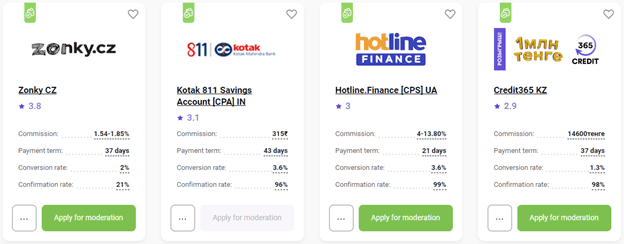
In the finance vertical, affiliate networks most commonly work with CPA and revenue share commission models. For example, affiliates may earn a fixed payment for a credit card approval they refer, or make ongoing commissions from trading volume generated by referred users.
Finance offers tend to pay very competitively, with average EPCs (earnings per click/conversion) frequently over $100+ for products like loans, credit cards, and other lending products. Finance offers also comply with most traffic sources.
Crypto
Crypto is a relatively new vertical in affiliate marketing that emerged over the past few years as digital currencies like Bitcoin went mainstream. Now there are many crypto CPA offers available, including cryptocurrency investing apps, trading platforms and exchanges, auto-trading bots, cloud mining services, ICOs and IEOs, and even crypto-based online casinos and gambling sites.
Most crypto offers pay affiliates on a CPA basis, with commissions earned for referred users signing up and completing account registrations, verifying IDs, or making an initial deposit or purchase.
Crypto offers have the highest payouts. Some pay affiliates a revenue share on exchange trading fees or commissions generated from their referrals. So affiliate earnings continue as long as the referred users remain active.
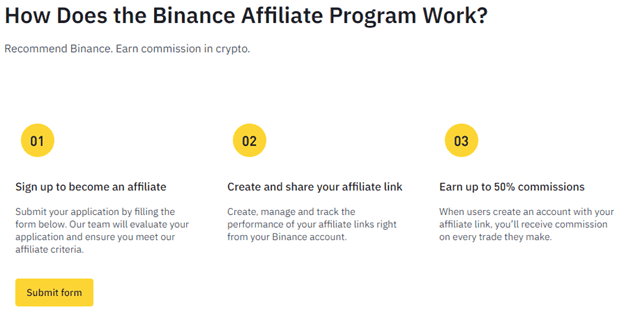
Educational courses
The education affiliate marketing vertical covers online courses, training programs, ebooks, coaching services, and other digital info products within a wide range of topics. Advertisers are educators and experts who create educational products to teach students new skills, knowledge, or expertise.
Some examples of education offers:
- Weight loss courses teaching popular diets like keto, paleo, and intermittent fasting.
- Financial courses to improve money management skills and investing knowledge.
- Job skills training and certification programs in fields like coding, digital marketing, design, etc.
- Dating and relationship advice guides.
- Cooking tutorials.
Education affiliate networks compensate affiliates using either a fixed CPA structure, paying per sale or lead. Some offers pay affiliates a percentage of the course sales or membership fees generated by their traffic.
Mobile subscriptions (mVAS)
Mobile subscription offers (mVAS) provide a way for mobile users to subscribe to premium content like ringtones, wallpapers, horoscopes, jokes, adult videos, sports highlights, celebrity gossip, and much more.
The advertisers are mobile operators and carriers who act as the content providers. CPA networks work with mVAS programs from operators worldwide.
When users land on the mobile content promotion page, they can quickly subscribe directly via SMS or by clicking a few confirmation buttons on the mobile site/app. The operator then bills the subscription fee to the user's mobile account.
Affiliates earn commissions when the referred user repurchases the recurring subscription, which may be daily, weekly, or monthly. Affiliates also often earn revenue share on subscription renewals and ongoing re-bills.
Multivertical
These CPA networks work with a diverse range of offers across many different verticals, categories, and niches. For example, one multi-vertical affiliate network may feature different offers from finance, dating, ecommerce, nutra, gambling, sweepstakes, and many more.
Multi-vertical networks actively curate the top offers from various niches to provide their partners access to the most lucrative opportunities. This saves affiliates time as they don't have to vet as many offers individually.
Working with a multi-vertical CPA network allows you to test and scale campaigns across many different categories and offers through a single CPA platform and account manager.
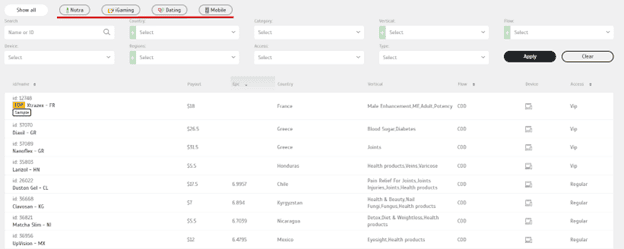
How to choose the best CPA affiliate network
An affiliate network serves as the intermediary between advertisers and affiliates. The best CPA networks provide the technology, tracking, reporting, payments, and support that make the affiliate-advertiser relationship mutually beneficial.
When choosing potential affiliate networks, here are some key factors to evaluate:
- What verticals and offer types does the CPA network specialize in? Do they align with your interests?
- Number of active campaigns, offers, and advertisers you can access. More options are better.
- Commission structures and payouts for each offer. Focus on ones with attractive earnings potential.
- Custom deals, bonuses, and increased payouts are offered to proven affiliates with high-quality traffic.
- Strength of tracking platform and analytics for optimization. Reliable stats are critical.
- Responsiveness of your personal affiliate manager and general customer support.
- Payment methods, minimums, schedules, and reliability. Getting paid quickly and consistently matters.
The right affiliate network can help affiliates see a big difference in ad campaigns. So take the time to thoroughly evaluate various CPA networks before deciding on the best partners for your business.
Conclusion
To achieve success in affiliate marketing, you need to select one or more verticals or offer types to focus on, thoroughly research different CPA networks that pay weekly, and choose the ones that best align with your traffic sources and profit goals.
Once the CPA network and offers are selected, you can launch an advertising campaign. To get help launching and optimizing campaigns, register with the MyBid advertising network.


